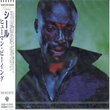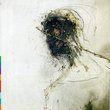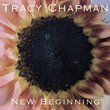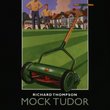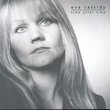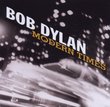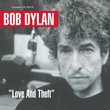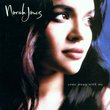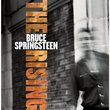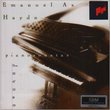| All Artists: Samuel Barber, Marin Alsop, Royal Scottish National Orchestra, Thomas Trotter, Karina Gauvin Title: Barber: Knoxville, Summer of 1915 Members Wishing: 0 Total Copies: 0 Label: Naxos American Release Date: 5/18/2004 Genres: Pop, Classical Styles: Vocal Pop, Opera & Classical Vocal, Forms & Genres, Concertos, Symphonies Number of Discs: 1 SwapaCD Credits: 1 UPCs: 636943913420, 636943913420 |
Search - Samuel Barber, Marin Alsop, Royal Scottish National Orchestra :: Barber: Knoxville, Summer of 1915
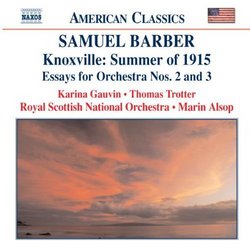 | Samuel Barber, Marin Alsop, Royal Scottish National Orchestra Barber: Knoxville, Summer of 1915 Genres: Pop, Classical This fifth installment in Naxos's Barber series is conducted by 2003 Gramophone Artist of the Year Marin Alsop. This disc features the richly romantic Knoxville: Summer of 1915, a `lyric rhapsody' for soprano and orchestra... more » |
Larger Image |
CD DetailsSynopsis
Album Description This fifth installment in Naxos's Barber series is conducted by 2003 Gramophone Artist of the Year Marin Alsop. This disc features the richly romantic Knoxville: Summer of 1915, a `lyric rhapsody' for soprano and orchestra, sung by Karina Gauvin, who has rapidly established a reputation for excellence internationally. Her charismatic performances fuse a brilliant voice, with an elegant style, and masterful interpretation. The Second Essay for Orchestra is widely regarded as the tightest, most incisive of the three compositions bearing this title; some even consider it a single movement symphony more than an essay—it is densely packed, and more happens in its scant ten minutes than in some works which sprawl for half an hour. The rarely-recorded Toccata Festiva for organ and orchestra which, with its fast, furious opening fanfare and virtuosic cadenza, is a veritable tour deforce for the soloist. Similarly Requested CDs
|
CD ReviewsThe Naxos series of Barber recordings continues virtuously Dan Fee | Berkeley, CA USA | 12/06/2004 (5 out of 5 stars) "The idea of virtue, connoting an active quality of goodness, might seem oblique in connection with a music recording; but something very like virtue gathers as this regular, 16-bit CD spins merrily in my upsampled player. Kudos to Ms. Galvin, a Canadian soprano of some reputation. I am sorry to say that I found her earlier recordings very fine, but less than consistent. One track seemed compelling to me, followed by a track or two that seemed competent and not much more. In this case of Barber's Knoxville, all hesitations and doubts must simply dissolve in the face of her superb vocalism, matched effortlessly to Barber's rather mystical setting of the famous Agee text. While the words tell us of a long-faded American tapestry of extended family, timeless childhood being, and the passing parade of changing civilization in the early twentieth century; Barber's genius is that he has the music make clear to us that this snapshot captures its time and place as variants of a universal human condition. I am reminded of the character's return to life's moments after having first settled into the empty grave's chairs playwright Thornton Wilder puts on one side of the stage, across from passing life as we typically live through it. It's all happening too fast, the character exclaims, bringing home to us the ineffable poignancy of our having lived so much that we cannot capture the first time around, nor recapture in memory or nostalgia or recollection. This music is dangerous repertoire, insofar as it asks us as audience members to remember that we do not live so long, nor so fully on this earth, regardless of how many years we do live. In less than expert hands, this piece can turn pale and maudlin, rather than - as here sung by Ms. Gauvin - poised and elegant and wise with melancholy acceptance. Based on this CD, it is safe to conclude that Ms. Gauvin has matured into consistency of being in command of her considerable resources. The remainder of the CD only makes inescapably clear how well the entire series is being steered and helmed by Marin Alsop. Typically, she has been offered the Bournemouth Symphony in England, by an orchestra administration who surely know a gifted conductor when they hear one, even if she is a woman. Thank you, Antonia Brico. (First woman to conduct the Berlin Philharmonic, among other things, in 1930's.) The late Walter Legge is supposed to have said that he knew he was hearing a great conductor when somebody could take a sixth rate orchestra and get them to play like a second rate band. So far, none of the orchestras that have been privileged to play under Marin Alsop have been in the world's famous top ten; but when you hear these performances, you find yourself thinking that maybe a whole lot of very fine music is going on the world, aside from marketing cache or brand-name recognition. The Scottish RNO has been a good orchestra for some time now; so the Barber series has been continuing at a very high level, indeed, especially when you consider that Naxos is a budget label by design. Here we have absolutely nothing of the old 101 strings; or the east European radio orchestra scratch. One is grateful to the series, if for nothing else than so eloquently demonstrating to us that there is more to the music of Samuel Barber than his reputation as a slightly dotty old-uncle of a past American master allows. To classify him as an American romantic composer is fine, so long as you know the difference between sappy-fizzy romantic bar drinks with parasols from Taiwan on top; and something else in American music which seems to be aging into a liquored-up strong finish with a rich, complex bouquet. Barber's harmonic and narrative directness capture something that we have come to recognize as a definitive dimension of our national identity in music. But the lyricism and the harmony are not sugar-intensive, in these performances. (Just right, this disc.) Marin Alsop and the RNSO reminds us in the second and third essays for orchestra that Barber could and often did say more in ten or fifteen minutes, than some blustery composers seem to say in thirty or forty-five. There is an almost late-Sibelius concision of evolution at work here, with a surprising sense that tonality is not the placid glass surface that many who don't listen too closely might assume it to be. Finally, we get the little-played Toccata for organ and orchestra, written to show off the Philadephia Orchestra's new organ, a gift of philanthropic Mary Zimbalist. If you like the organ mix with orchestra, this will tickly your fancy. It is played deftly and with musical imagination by Thomas Trotter in the lofts. If you don't know Barber, this is a rewarding place to start. If you have been collecting the Barber Naxos series previously, then take heart, this one is another keeper. Five stars, not that distantly shining, almost right above us on a very, very clear night." It just misses Glen A. Gill | Cincinnati, OH United States | 10/18/2008 (3 out of 5 stars) "First, bravo to Naxos for doing a Barber series; long overdue. I'm just sorry that Thomas Schippers wasn't around to do it. Alsop is a fine conductor but her Barber misses. Perhaps part of the reason was the choice of orchestra. Don't get me wrong. The RSNO is a very fine orchestra but they just don't have the right feel, or she just isn't conveying the right mood. This may not be her fault entirely. Non-American orchestras performing American music never seem to get it right; ever. For a person on a very slim budget, these are OK and there is something to be said about consistency. But, for those who want something more definitive, you must search out the recordings by Thomas Schippers. His recording of Medea's Dance, the Adagio (the only version to own), the Second Essay and the School for Scandal with the NYPO are infinitely superior despite the dated sound. Then, you have his recording of the Knoxville with Leontyne Price. Regarding the Toccata, Schippers never recorded the work but he was the person Barber went to when he needed help with writing the organ part. Generally, the superior version is the one by E. Power Biggs with Eugene Ormandy and the Philadelphia Orchestra." Nicely done all around, but the Knoxville isn't deeply felt Santa Fe Listener | Santa Fe, NM USA | 06/30/2006 (4 out of 5 stars) "It's daunting to record Barber's vocal masterpiece, 'Knoxville: Summer of 1915,' which has been superbly sung by no less than Eleasnor Steber, Leontyne Price, and Dawn Upsahw, all at the peak of their powers. Just below that peak we have redings by Sylvia McNair and Roberta Alexander. Knoxville is a work I cherish. It requires much: a luminous soprano voice, floating high notes that must appear effortless, and a deep feeling for James Agee's heartbreaking poetry, which fuses nostalgia and mysticism. In this case, Karina Gauvin has the right voice, but she tiptoes around the notes and is almost neutral in the text. Her best moments are inward, and there are quite a few of those, but she doesn't take us very far emotionally.
Marin Alsop is sympathetic to Barber's idiom, and his flowing lyricism seems well suited to a feminine perspective. Alsop is unusually soft and gentle in Knoxville. When she gets to the Second Essay, her small-scaled reading begins to lapse a bit rhythmically. The playing is lovely, but I don't hear a strong enough point of view. She is meticulous and cautious in the Third Essay. The performance that has real guts is the Toccata, one of Barber's least played pieces--orchestras don't seem to feature organ soloists anymore. But Poulenc had shown the way in modern organ concertos, and here Barber alternates his lush singing style--one of the themes even echos Knoxville--with free-form organ obligattos that Thomas Trotter plays thrillingly on an excelent instrument. In the end, I wound up enjoying the least familiar work the most. Naxos provides wonderful sonics, and everyone is to be commended for doing Barber the service of letting us hear all his major works." |

